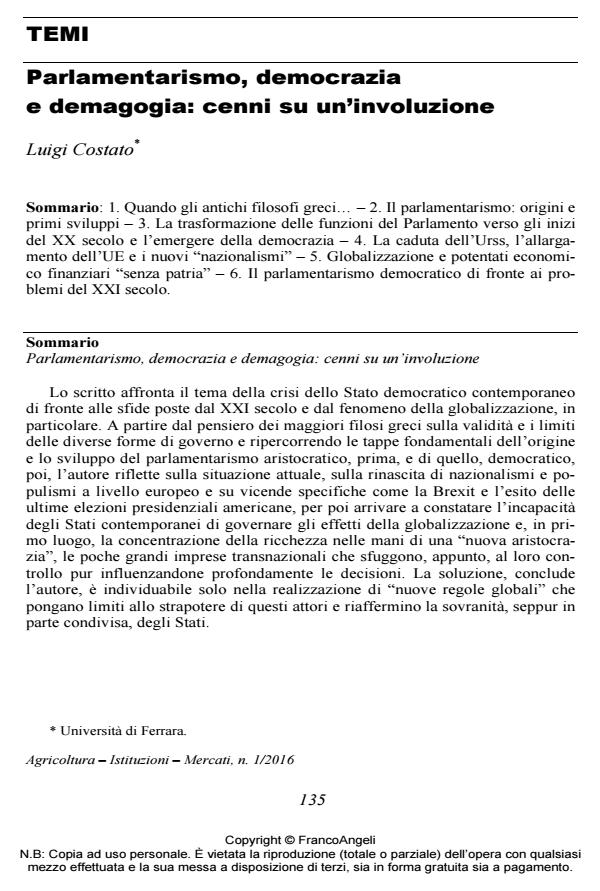Parliamentarianism, democracy and demagogy: signs of involution
Journal title AGRICOLTURA ISTITUZIONI MERCATI
Author/s Luigi Costato
Publishing Year 2018 Issue 2016/1 Language Italian
Pages 20 P. 135-154 File size 313 KB
DOI 10.3280/AIM2016-001007
DOI is like a bar code for intellectual property: to have more infomation
click here
Below, you can see the article first page
If you want to buy this article in PDF format, you can do it, following the instructions to buy download credits

FrancoAngeli is member of Publishers International Linking Association, Inc (PILA), a not-for-profit association which run the CrossRef service enabling links to and from online scholarly content.
The essay deals with the issue of the crisis of the contemporary democratic state in the face of the challenges posed by the 21st century and, more specifically, by the phenomenon of globalization. The Author starts from the major Greek philosophers’ thought on the validity and limits of the different forms of government. He then retraces the fundamental stages of the origin and development of aristocratic parliamentarianism and the later democratic parliamentarianism in order to reflect on the current situation, on the rebirth of nationalism and populism at European level and on specific events such as Brexit and the most recent American presidential elections. The inability of contemporary states to control the effects of globalization and the concentration of wealth in the hands of a "new aristocracy" - a few large trans-national corporations - is underlined. The Author concludes by highlighting the need for "new global rules" that put limits on the excessive power of these actors and reaffirm the sovereignty, albeit partly shared, of the States.
Keywords: Parliamentarianism, Democracy, Demagogy
- Adorno F. (1977), Introduzione a Platone, Laterza, Roma-Bari.
- Aristotele, Politica, introduzione, traduzione e note di C.A. Viano (2002), Bur-Rizzoli, Milano.
- Berti E. (1997), Il pensiero politico di Aristotele, Laterza, Roma-Bari.
- Costato L. (2015), Il libero mercato e lo Stato, Agricoltura, Istituzioni, Mercati, 2-3.
- Croce B. (1962), Storia d’Italia dal 1871 al 1915, Laterza, Roma-Bari.
- Davies R.G., Denton J.H. (a cura di) (1981), The English Parliament in the Middle Ages, Manchester University Press, Manchester.
- Hobsbawm E.J. (2007), La fine dello stato, Rizzoli, Milano.
- Holt J.C. (1965), Magna Carta, Cambrige University Press, Cambridge.
- Kahn C.H. (2008), Platone e il dialogo socratico. L’uso filosofico di una forma letteraria, Vita e Pensiero, Milano.
- Kamp A. (1993), La teoria politica di Aristotele. Presupposti e temi generali, La città del Sole, Napoli.
- Koselleck R. (1988), La Prussia tra riforma e rivoluzione (1791-1848), il Mulino, Bologna.
- Kullmann W. (1992), Il pensiero politico di Aristotele, Guerini e Associati, Milano.
- Laurenti R. (1993), «Introduzione», in Aristotele, Politica, a cura di L. Laurenti, Laterza, Roma-Bari.
- Luconi S. (2017), La nazione indispensabile – Storia degli Stati Uniti d’America, Feltrinelli, Milano.
- Lutz (1992), Tra Asburgo e Prussia. La Germania dal 1815 al 1866, il Mulino, Bologna.
- Mack Smith D. (2000), Storia d’Italia, Laterza, Bari-Roma.
- Mathiez A., Lefebvre G. (1994), La rivoluzione francese, Einaudi, Torino.
- Palermo F., Nicolini M. (2013), Il bicameralismo. Pluralismo e limiti della rappresentanza in prospettiva comparata, Edizioni Scientifiche Italiane, Napoli.
- Pirenne H. (1967), Storia d’Europa dalle invasioni al XVI secolo, Sansoni, Firenze.
- Pirenne H. (1967), Storia economica e sociale del Medioevo, Garzanti, Milano.
- Platone, La Repubblica, a cura di F. Sartori (1994), Laterza, Roma-Bari.
- Platone, La Repubblica, a cura di M. Vegetti (1998-2007), 7 voll., Bibliopolis, Napoli.
- Polibio, Le Storie, traduzione, introduzione e note di C. Schick (1955), Mondadori, Milano.
- Popper K.R. (1996), La società aperta e i suoi nemici, vol. I, a cura di D. Antiseri), Armando Editore, Roma.
- Roskell J.S. (1965), The Commons and their Speaker in English Parliaments, 1376-1523, Manchester University Press, Manchester.
- Sayles G.O. (1975), The King’s Parliament of England, Edward Arnold, London.
- Taylor F.W. (1911), L’organizzazione scientifica del lavoro, trad. it. di F. Garella, L. Grandi, L. Zannini, Etas, Milano, 2004.
- Tocqueville A., La democrazia in America, a cura di M. Tesini, trad.it. di S. Furlati, Città Aperta, Troina (En), 2005.
- Vegetti M. (1994), «Introduzione», in Platone, La Repubblica, a cura di F. Sartori, Laterza, Roma-Bari.
- Vegetti M. (2009), «Un paradigma in cielo». Platone politico da Aristotele al Novecento, Carocci, Roma.
Luigi Costato, Parlamentarismo, democrazia e demagogia: cenni su un’involuzione in "AGRICOLTURA ISTITUZIONI MERCATI " 1/2016, pp 135-154, DOI: 10.3280/AIM2016-001007